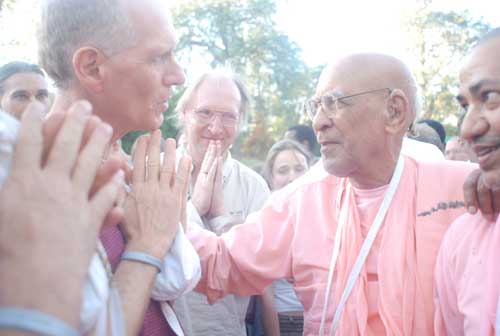Badger, California: June 11, 2010
Morning Walk
Brajanath dasa: Prabhu is asking: You explained in Hawaii some years ago that sambhoga (the pastimes of Krsna and His associates in meeting), is higher than vipralambha (the pastimes in the mood of separation).
Srila Narayana Gosvami Maharaja: I have also sometimes told that vipralambha dances on the head of samhhoga. But, do any of you want the separation of Radha and Krsna?
Devotees: No.
Srila Narayana Gosvami Maharaja: Do any of you want this?
Devotees: No. Never.
Srila Narayana Gosvami Maharaja: So, which is greater?
Devotees: Sambhoga.
Srila Narayana Gosvami Maharaja: Yet, Krsna wants everyone in the world to know that Radhika is His topmost beloved – not only in meeting, but in separation.
Sripad Madhava Maharaja: Both sambhoga and vipralambha are needed – like two sides of a coin. Without vipralambha, sambhoga cannot be nourished.
Sripad Bhagavat Maharaja: Srila Gurudeva, now, because you have written the book Journey of the Soul, some persons are saying that the jivas have not fallen from Goloka Vrndavana, but that they are in Goloka sleeping, and their dream is the dream of this world.
Srila Narayana Gosvami Maharaja: They are the ones who are seeing a dream.
Sripad Bhagavat Maharaja: They are trying to change their philosophy now.
Brajanath dasa: They were saying that even before the publication of the book.
Sripad Damodara Maharaja: This is mayavada completely. How can maya cover the liberated soul?
I never got a good answer about this: why does the jiva forget his previous life?
Srila Narayana Gosvami Maharaja: Krsna has made the world like this. If we would not forget everything after taking our next birth, we would not be able to survive. We would die. We cannot imagine how much suffering one experiences at the time of death.
Sripad Visnu Maharaja: Raganuga-bhakti is very high; it is rare that a person can follow it. In vaidhi-bhakti there are so many rules and regulations and mantras for arcane (worship). So, what are we doing here? Vaidhi-bhakti, or raganuga-bhakti, or something else? Vaidhi-bhakti leads [*See Endnote 1]to Vaikuntha. We are hearing hari-katha from you and the Vaisnavas – not about Vaikuntha – but still I don't think we are following raganuga. [*See Endnote 2]
Brajanath dasa: He is saying that raganuga-bhakti is very rare and difficult to attain. Vaidhi-bhakti is also very difficult, because there are so many rules, regulations, mantras...
Srila Narayana Gosvami Maharaja: No. Vaidhi-bhakti is easy. Anyone can perform vaidhi-bhakti – anyone.
Sripad Bhagavat Maharaja: What are your followers practicing? Are we practicing vaidhi or raganuga?
Srila Narayana Gosvami Maharaja: We are doing vaidhi-bhakti and aiming for raganuga-bhakti. Some, those who are qualified, are practicing raganuga; and some propose to be qualified, but are not.
Brajanath dasa: Sajjana Maharaja is preaching everywhere – in South America, North America, Middle America...
Srila Narayana Gosvami Maharaja: Damodara Maharaja – not less.
Sripad Sajjana Maharaja: Gurudeva, some devotees say that they are following raganuga-bhakti, so there is no need for them to perform the activities of vaidhi-bhakti – no need for mangala-arati or any other regulations.
Srila Narayana Gosvami Maharaja: [With sarcasm] They are also higher than Krsna.
Sripad Damodara Maharaja: Krsna goes to mangala-arati.
Sripad Madhava Maharaja: Ask them to stop their passing of urine and stool, and eating and sleeping. [*See Endnote 3] Then we will understand what kind of bhakti they are doing. Or, are they simply enjoying their senses?
Nityananda dasa: I have read that part of our siddhanta is that there must be at least one devotee in the world who is worshipping Srimati Radhika on the level of bhava – otherwise the world would be destroyed. I read this in an article by Srila Vamana Gosvami Maharaja. [*See Endnote 4] I don't understand why the world will be destroyed if there is no such devotee in the world.
Srila Narayana Gosvami Maharaja: This is correct, but such devotees are rare.
Sripad Madhava Maharaja: He can't understand why the world will be destroyed.
Srila Narayana Gosvami Maharaja: This is the rule and regulation of Krsna; no one can change it.
Prana-govinda dasa: When the jiva first falls into the material world, does he always take a human form first, or might he take any other form?
Srila Narayana Gosvami Maharaja: He may take any kind of form among any of the 8, 400,000 species of life.
Abhirama dasa: Srila Gurudeva, when you will perform prana-pratistha (installation of the Deities in a temple) in Houston, will the temple be the same as your temples in Vrndavana?
Srila Narayana Gosvami Maharaja: I have told them to make their temple like our temple in Govardhana.
Abhirama dasa: Will the speciality of the Govardhana temple – which is Giriraja Govardhana Himself – be the same in Houston? Will you bring the same Giriraja Govardhana to Houston? Will both places be non-different?
Srila Narayana Gosvami Maharaja: I will see.
Syamasundara dasa: Srila Gurudeva, I also have a question about prana-pratistha. On page 422 of the biography of your Gurudeva, our Parama-gurudeva, you quote Parama-gurudeva saying that if the vigraha (Deity) is not installed by a maha-purusa, a fully self-realized soul, then Thakurji (the Lord in His Deity form) is not present; only a statue is present there. But some persons are saying that if we simply have some faith that Krsna is there, then He is there. How do we reconcile that?
Srila Narayana Gosvami Maharaja: That is right. The Deity should be established by a maha-purusa. It is not that anyone can do this. [The maha-purusa invites Krsna to come by Vedic mantras. Krsna is controlled by him. ed] "Krsna sei tomara...." Krsna, Govinda, is resting in the heart of the maha-bhagavatas, or maha-purusas.
Sripad Asrama Maharaja: If a maha-purusa (maha-bhagavata) doesn't establish Thakuraji, then Thakuraji is not there?
Brajanath dasa: Gurudeva, Maharaja is asking that if any general devotee – not a maha-purusa – performs the prana-pratistha ceremony, then Thakurji is not there?
Srila Narayana Gosvami Maharaja: Not there.
Sripad Asrama Maharaja: If people who are worshipping the Deities commit Vaisnava aparadha (offences to any pure devotee), is it possible that Thakuraji may leave, or is He always there?
Srila Narayana Gosvami Maharaja: In that case, there is no use of their Thakuraji worship. If one is committing such aparadha, no fruit will come from such worship and that person will go to hell.
Sripad Madhava Maharaja: Thakuraji will not accept that person's service.
Srila Narayana Gosvami Maharaja: Are there any more questions?
Sripad Asrama Maharaja: Sometimes devotees worship their Deities for a long time, and their Thakuraji are not installed by a maha-purusa. Yet, sometimes Gurudeva has said to continue worshipping Them.
Srila Narayana Gosvami Maharaja: Yes. [*See Endnote 5]
Where is he from?
Brajanath dasa: Canada. He is the father of Krsna-prema.
Srila Narayana Gosvami Maharaja: [to Krsna-prema] He is your father? Very good. [To the father, Jnana-sakti dasa:] You are happy that he is in the matha (temple)?
Jnana-sakti dasa: Very happy.
Devotee: Gurudeva, if the jiva's constitutional position is that he is an eternal servant of Krsna, then why do some jivas go to Vaikuntha to serve Narayana there?
Srila Narayana Gosvami Maharaja: Oh, Narayana is Krsna. All the manifestations of Krsna are Krsna in tattva (by philosophical truth).
Vrndavana dasa (of Hawaii): If a madhyama-adhikari performs prana-prastistha, is there no result?
Srila Narayana Gosvami Maharaja: Yes. [*See Endnote 6]
Devotee: What is the method for a sadhaka to perform visvrambhena-gurau seva (intimate loving service to Gurudeva) from far away?
Srila Narayana Gosvami Maharaja: One should simply have the ambition to do that seva; and then one can serve him by one's money, one's energy, and by doing the needful in any circumstance.
Brajanath dasa: One time you told us that if a person has to go far away for his job, he is always remembering his family. He saves money for them, sends them that money, calls them, and writes them letters; he is always serving them. Similarly, this can be done with Gurudeva.
Padmanabha dasa: This is Danny. He is coming from Indiana.
Srila Narayana Gosvami Maharaja: What does he want?
Padmanabha dasa: He wants to take harinama tomorrow.
Srila Narayana Gosvami Maharaja: Yes, if he wants to take, he can take.
Radha-kanta dasa: In Bhakti-rasamrta-sindhu, there is this verse:
krsnam smaran janam casya
prestham nija samihitam
tat tat katha ratas casau
kuryad vasam vraje sada
[While remembering Sri Krsna and His beloved associates whom one desires to follow, being fully absorbed in discussions of their pastimes, one should always reside in Vraja. If this is not possible, then one should reside there by mind. (Bhakti-rasamrta-sindhu 1.294)]
Prestham nija samihitam. What is that process in choosing a very near and dear associate? Is it manifest through our sadhana, or do we choose him by hearing?
Srila Narayana Gosvami Maharaja: Srila Rupa Gosvami has written:
tan-nama-rupa-caritadi-sukirtananu-
smrtyoh kramena rasana-manasi niyojya
tisthan vraje tad-anuragi-jananugami
kalam nayed akhilam ity upadesa-saram
[While living in Vraja as a follower of those who are attached to Sri Krsna, one should utilize all his time by gradually transferring the absorption of his tongue and mind from matters other than Krsna to the chanting and remembering of narrations of Sri Krsna's name, form, qualities, and pastimes. This is the essence of all instructions. (Upadesamrta, verse 8)]
This verse tells the process. The devotee will be in Vrndavana, the place of Krsna's pastimes. Tan nama – He will always chant the holy names. And smarana – he will remember the pastimes connected with these particular names – such as Damodara, Rasa-bihari, Radhanatha. Under the guidance of a raganuga-bhakta he will remember these important names that are connected with Radha,. This is the process. If one cannot physically reside in Vrndavana, then he should think, "I am in Vrndavana."
Radha-kanta dasa: Are we personally choosing, or is it something that manifests in the heart?
Srila Narayana Gosvami Maharaja: It will come by hearing. We should try to hear more and pray more, and then that will come.
Radha-kanta dasa: The second part of the verse says one should always hear and chant about those dear associates. But In preaching, so many subjects need to be told, like Prahlada-carita and Dhruva-carita (the life and character of Prahlada Maharaja and Dhruva Maharaja.)
Srila Narayana Gosvami Maharaja: Not all the time, but from time to time. At last, everything external will go away and you will become internally absorbed. "Krsnam smaran janam casya prestham nija." You will follow the dear associate for whom you have greed in raganuga-bhakti. In this regard, you may remember Rupa Gosvami as an associate of Sri Caitanya Mahaprabhu (his sadhaka-svarupa), and his siddha-svarupa in Vraja as Rupa Manjari.
Srila Narayana Gosvami Maharaja: Who has brought that chair?
Brajanath dasa: Sivananda.
Srila Narayana Gosvami Maharaja: [To Sivananda-sena dasa] Oh, you. That is why I sat on it.
Devotee: I would like to ask you a question. I now live in Oregon and work as a mechanic. I would like your permission to change my occupation.
Srila Narayana Gosvami Maharaja: Yes.
Devotee: My friend has many cows, and I would like to start a dairy.
Srila Narayana Gosvami Maharaja: You can do that.
[*Endnote 1: (Sri Caitanya-caritamrta, Madhya-lila 22.109) "Those who have not attained the platform of spontaneous attachment in devotional service render devotional service under the guidance of a bona fide spiritual master according to the regulative principles mentioned in the revealed scriptures. According to the revealed scriptures, this kind of devotional service is called vaidhi-bhakti.]
[Endnote 2: (Sri Caitanya-caritamrta, Madhya-lila 22.149) The original inhabitants of Vrndavana are attached to Krsna spontaneously in devotional service. Nothing can compare to such spontaneous devotional service, which is called ragatmika-bhakti. When a devotee follows in the footsteps of the devotees of Vrndavana, his devotional service is called raganuga-bhakti. (Caitanya-caritamrta, Madhya-léla 22.150) When one becomes attached to the Supreme Personality of Godhead, his natural inclination to love is fully absorbed in thoughts of the Lord. That is called transcendental attachment, and devotional service according to that attachment is called ragatmika, or spontaneous devotional service. (Caitanya-caritamrta, Madhya-lila 22.152) Thus, devotional service which consists of raga [deep attachment] is called ragatmika, spontaneous loving service. If a devotee covets such a position, he is considered to be most fortunate. (Caitanya-caritamrta, Madhya-lila 22.153) If one follows in the footsteps of the inhabitants of Vrndavana out of such transcendental covetousness, he does not care for the injunctions or reasonings of sastra. That is the way of spontaneous love.
[Endnote 3: A person mature in raganuga-bhakti is beyond these bodily necessities. –ed]
[Endnote 4: "Performing bhajana with the inclination to serve Srimati Radhika is the best type of bhajana. It cannot be said that no one is qualified to perform this kind of bhajana. In this world there is always a rupanuga Vaisnava who is capable of doing such bhajana. Past, present, and future, there will always be someone with this qualification. To say otherwise is incorrect because the world would face destruction if it lacked the presence of such a qualified person." ("Jewels from the Ocean of Separation," translated by the Rays of the Harmonist team, Kartika, 2005)]
[Endnote 5: By such worship a person's life will become regulated – Sripad Bhaktivedanta Madhava Maharaja]
[Endnote 6: This is Vedic culture. He is under the guidance of the uttama-adhikari. He is remembering and realizing his uttama-adhikari Gurudeva's presence, thinking, "You are doing this, and we are helping." Everything depends on the degree of surrender of that madhyama-adhikari to his Gurudeva. – Sripad Bhaktivedanta Madhava Maharaja]









